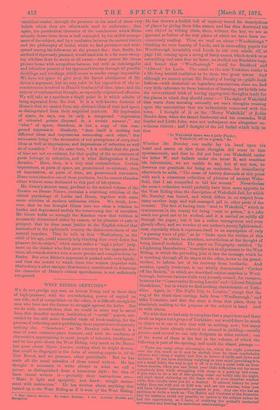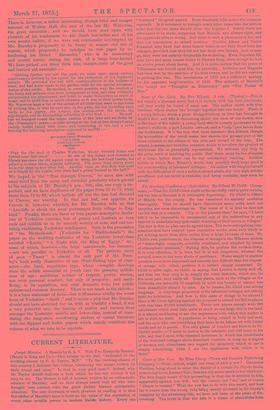WEST RIDING SKETCIIES.*
WE do not grudge any man an honest living, and in these days of high-pressure, with the overwhelming power of capital on one side, and of competition on the other, it is difficult enough for men who have not the former to struggle against the latter. But we do wish, nevertheless, that we could in some way be saved from this dreadful modern institution of " casual " papers, suc- ceeded by the still more dreadful trade of book-making, for the process of collecting and republishing these papers is too frequently nothing else. "Saunterer," as Mr. Burnley calls himself, is a man of some common-place humour, and with the readiness of observation appertaining to most people of tolerable intelligence, and he has gone about the West Riding, very much as Dr. Davies has gone about Mystic London, seeking what he might devour, that could be disgorged in the form of amusing papers in All the Year Round, and we presume, other periodicals. But he has made all the usual mistakes of these casual writers. He has thought it necessary to write always in what we call a jocose, as distinguished from a humorous style ; the idea of these casual writers is—probably their instructions are- " Make it light and sprightly, you know ; mingle amuse- ment with instruction." He has written about anything that turned up in the West Riding as if it were of the West Riding.
• West Riding Sketches. By James Burnley. 1 vol. London: Hodder and Stoughton. He has thrown a foolish veil of inystery round his descriptions of places by giving them false names, and has thus destroyed his own object in writing thein, since,'without the key, we are as ignorant as before of the real 'Ades of which we have been un- conscieusly reading. Thus, We reed on about "Woolborotigh " thinking we were hearing of Leeds, and in succeeding papers for Woolborough invariably read Leeds in our own mindri, till, at page 142, coming upon a String of fancy names, 'vihich atria us as resembling real ones that we knew, we studied our BMdsliiiiVinap, and 'found tt " 'Woolborough " stood for Bradford' and ".Allwool" for Leeds. The result to the non-Yarkshire render is a life-long mental confusion as to those two great .toWns. And although we cannot accuse Mr. turgley of boring us---guide-book fashion--,with- historical -or legendary associatious, sin,ce we find very little reference to these branches of learning, yet he falls into' the conventional trick of having appropriate thoughts ready for the places in which they should, occur :—" The sight of Wakefield that warm June morning naturally set one's thoughts running upon the .associations that are indissolubly connected With the town. I thought of it as the Merry Wakefield ' of 'Aebin Hood's .days, when the famed freebooter and his comrade's', -Will Scarlet and Little John, were not unfreeptent nor altogether-'un- welcome visitors, and I, thought of the old ballad which '400:4 that
"In Wakefield there was a jolly Pinder,
In Wakefield, all on a green," &c.
Whether Mr. Burnley can really, lay his hand upon his heart and assure us; that these -.thoughts .did occur to him spontaneously, and that he did not hunt out Wakefield under the letter W; and -ballads under the- letter B, and combine his information, we are unable to Say, but at any fate; he. deserves our gratitude for being so, moderate, for immediately afterwards he adds, "The muse of history descends at this point' with such a numerous collection of pictures of ancient Wake- field, that I am compelled to bid her avaunt." Nevertheless. the muse's collection would probably have been more apposite to the West Riding than the description of Wakefield Jail, for which Mr Bnanley, was beund, and which differs lu, no respect from many another large and well-managed jail in other parts of the country. The fact of haying been "sent to Wakefield," which is synonymous in. the county for being "sent to prison," is a joke much toe good not to be worked, and it is carried on mildly all' through the .paperi but it has a rather incongruous and even ghostly effect, and we wonder at our author's jaunty lighthearted- ness, especially when it expresses, itself; in an assumption of only "9,pessieg wave of pity," as he "looks upon the victims, of this desolation," in which he shudders, nevertheless, at the thought of being himself included. The paper on Telegraphy, entitled, "In a Lightning Manufactory, is eaother net at all germane to the West Riding, in which the pervading joke is that the message, which he is watching through all its stages at the office, is one to his grand- mother, to inform her of his recovery from toothache, And another, equally irrelevant, is one wittily denominated "Cricket off the Hearth," in whiekare described cricket-matches in Wool- borough, between. various clubs very jocosely named ; for instance, between the "Conservative Roaring Lambs" and "Liberal Blighted Dandelions," but in which we find nothing characteristic of York- shire. Again, in "The Night Trip to _London," except that the wag of the -third-class carriage hails from " Woolborough," an4 talks Yorkshire, and that the start is from that place, there is- absolutely nothing.to the purpose of the subject in hand. And.
so with others. _
We wish that we had only to complain that a paper here and there. dwelt on topics not apropos of Yorkshire; nor would there bench to object to in one or two that told us nothing new ; but many of those we have already referred to abound in padding--usnally jocose—and several we can only designate as utter rubbish ; one of the worst of these is the last in the .volume, of which the following is part of the Opening, and much the Wisest, passage :— "There are many other advantages, too, which the night possesses over the day, much as it may be shrunk from by those comfortable citizens who 'sleep o' nights' and live in horror of chills and dews and darkness. If you have anything weighing on your mind (providing It la not a small debt), the way to get it off is to take a quiet walk an hour. before sunrise, when you can think your little difficulties out far more completely than while struggling with sleep in a pent-up bed-room. If you want to do a bit of star-gazing, come out boldly into the night, and don't stand shivering on the inner side of your chamber window while Mrs. Candle rates you for a donkey. If natural history be your hobby, then out with you at 5.30 a.m. and see the sunrise, when you will have 'objects' innumerable revealed to you. Any one who has an ambition to write a work on 'The Habits and Customs of the Domestic Cat,' for instance, could not possibly do justice to the subject unless he had the opportunity, as I have, of studying the animal's nocturnal movements and hearing its melodious caterwaulings." There is, however, a rather interesting, though brief and meagre account of Walton Hall, the seat of the late Mr. Waterton, the great naturalist ; and we should have read again with pleasure of his tencleruesS to is dumb favourites and of his own ascetic habits, if we. were not continually interrupted by Mr. Burnley'a propensity to be funny in season and out of season, which propensity he indulges in this paper by in- troducing .his friend "Barnacles," who is in momentary and mortal terror, during the visit, of a large boar-hound. We have picked out three little bits, characteristic of the good and_ learned old naturalist " Getting further out into the park, we came upon many curious contrivances devised by the squire for the protection of his feathered friends. He provided the Owl with roosting-places in the hollows of trees, and had holes made In the garden walls forth() special-accommo.• dation 0 the swifts. He studied, in every possible way, the comfort of the birds and.auiOads that were companions to him, and they evidently reciprocateld the' attachment, and tried to mako themselves as much at home;'intllo as ranch pleasure as it was in their power•toido. Mr. Waterton:Ise:egg list of the:manias of all hirdirthat were in the...habit of :visiting him•j7pr.that he ever saw riathe.par.k, tbe list ineluding such birds as the . osprey; the kestrol, the carrion crow, the raven, tio nightingale, and'in attehishing collectihn'ef wild fowl. . By-and bye we tranced round the inwer portion of the lake-end sat:clown hi'. the j We ?4 grave,--a 4ttle mound at the foot ef two "decayed oalcs- rndelyotalykl,mund with atone, -and containing at . the. :foot a Cross
beitrifigthe following inscription efigrateale•mathre •
Orate pie anima Caroli - cujusfegga • ' j tuts haoc erueem 800a:toe- -•- • ;•
'Pray ler the' sou) Of Charles Waterton, whoSti viettd bones are buried hear thlictless.'• : . . . . In one of • the rooms newdevoted to ilibrartrrxrposes the old, squire :uses1 to aleep,,his bed.hard beards, his pillow„axoctcleh block, elightly hulloed., For more than ,thirty. years he neiç slept on any oiherbed. Another room on this floor was used arftealit011aY the squii•g;"*he'oftenliad a priest locatedln the ball?'" • We hoped, in the Min through' Craven," to meet also 'With some relief ft:pi:I.' the noisy and en:circled jocularity which prevail" inAli'Csilbjeets of 4111r. Burnley's' pen, but, alas, our copy is im- peifeet;' and we have dupliCates of the pages from 57 to 72, While thiAd from 72 to 89 which include all but the last 'leaf devoted to 'eraVen,r are Wanting: In that' last leaf, our appetite for Craven is, hewever,' whetted; for Mr. BrirideY tells 'Us' that 4‘ Arncliffe is about the most picturesque little village in Eng- land." Finally,' there arOthree or four papers descriptive doubt- less of Yorkshire custom, but of games and IestiVals so very rude and childish as to be scarcely worthy of note, and not cer; tainiy. vindicating Yorkshire -intelligence: Such is"the procession. of "the Bletherheads " "(Yorkshire for "Bladderheads") the paper on the 'ivetiding festivities of -the Yorkshire lower--class ,entitled "Knots," "A' Night with the King of Egypt," &c., some of which, however—the boys' masquerade, for instance, —are' not peculiar to Yorkshire at all. The pathetic story of poor " Tressy" is alniost ' the only part' of Mr. Burn- ley's book really illustrative Of one West-Riding type of char- acter,—the hard, acquisitive type, whose exemplar develops from the selfish sensualist of youth into the grasping selfish- ness of age ; ambitions' neither of respect, power, station, nor even personal comfort, but only of property ; and sacri- ficing, in its aquisition, not only domestic love, but public opinion and common decency. There is not much in the sketch— it is a bare statement of facts—but it illustrates vividly the worst form of Yorkshire "thrift 3" and it seems a pity that Mr. Burnley should not have sketched for us, with as truthful a hand, if not a very powerful one,' the history of nobler and various lives amongst the Yorkshire middle and lower-class, instead of inun- dating the long-since overflowing shelves of casual literature with the flippant and feeble papers which mainly constitute this volume of what we take to be reprints.



































 Previous page
Previous page